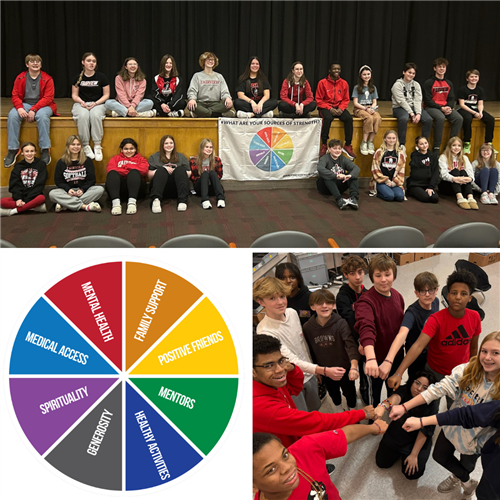
March 15, 2024
Since last school year, students and staff at Fairview High School and Lewis F. Mayer Middle School have been developing a plan to deliver another layer of support for mental health needs.
According to a 2021 Youth Risk Behavior Survey from the Centers for Disease Control and Prevention, 42% of high school students in the U.S. reported feeling so sad and hopeless for two weeks in a row that they stopped doing their usual activities. Nearly one in three (29%) experienced poor mental health.
“Schooling in 2024 is more than just the delivery of curriculum,” Fairview High School and Mayer Middle School Principal Chris Vicha said. “Now more than ever, education is about teaching the whole student. We as a community have come to understand that beyond the delivery of quality instruction is the need to be cognizant of and support the mental health of not only our students but also our staff.”
Sources of Strength is a new program at the high school and middle school designed to promote wellness, kindness, and strength inherent in the school community - including within each student.
“It’s about bettering themselves and feeling better about themselves,” Eighth Grade English Teacher Janice Frygier explained. “Strength is the keyword in this program. So, what are your strengths? What strength can you find from others? You have strengths within yourself to help yourself. But, then, sometimes you need to lean on somebody else or ask for help, which is what the wheel stands for.”
The Sources of Strength Wheel identifies eight areas where individuals can find strengths. The areas include family support, positive friends, mentors, healthy activities, generosity, spirituality, physical health and mental health.
“The adults and the kids in the program are trying to show that we are all in this together,” Frygier added. “It’s about how we can all help each other and try to be more mindful.”
Over the last year, approximately 24 students (grades 7-12) and 10 staff members were trained in Sources of Strength. The group selected four campaigns to help inform and engage individuals: “Get the Word Out”, “Trusted Adults”, “Connecting to Help,” and “What Helps Me?” All of the campaigns are currently running at the school.
“Sources of Strength is important to me because it gives students options in how they can find solutions to the issues that persist in their lives,” Ben Stoessner, a senior student leader in the program said. “I believe that other students in the school will feel more comfortable in confiding in others because of Sources of Strength.”
“Sources of Strength is important to me because it ameliorates the school environment for myself and others,” Spencer Bruening, a junior stated. “It breeds a community of connection, friendliness and safety. It will help others in my school by providing an outlet for stress and anxiety and can create an environment that is more suitable for learning and healthy connections.”
After beginning their work in October, the Sources of Strength student team presented assemblies to their peers on February 16. The entire 6-12 student body attended an assembly.
“We wanted to do them just like we were introduced to the program,” Frygier said. “We started with the icebreakers - loosen them up. Then you bring in the words. What do the words mean?”
“I am really proud of the groups and campaigns that put an assembly together,” Tori Slack, a seventh grade student said. “Being a student-led program, it can be hard to get off the ground. However, I think we did awesome.”
“It has been inspiring to watch that same group of students develop their leadership within the building and work with their peers to gain feedback, build resources and host events,” Vicha stated.
Frygier expressed many students asked about the program after the assembly and were interested in joining the Sources of Strength initiative. Sources of Strength will continue their campaigns throughout the rest of the year and into the future.
“You need to understand that it’s important that you need help,” Frygier added. “It’s okay. That’s normal, and you shouldn’t be embarrassed or afraid or any of those feelings. It’s okay. And I think we have to embrace that…we as a school and a community need to work together to show people that we are all here for each other.”